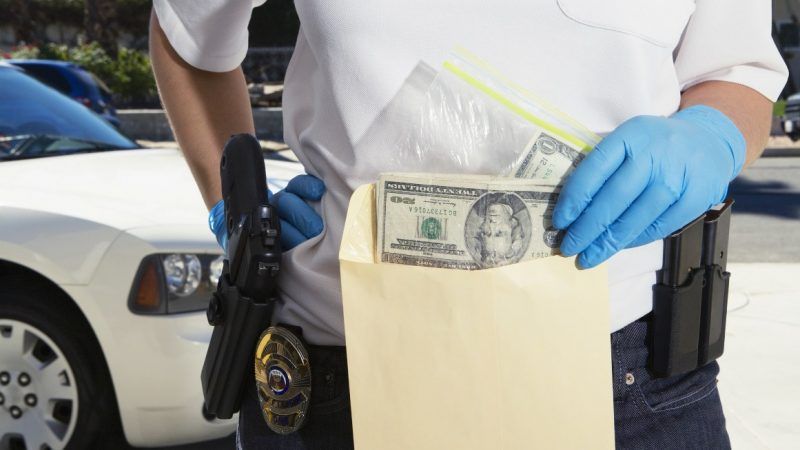Law enforcement groups have long argued that civil asset forfeiture, a practice that allows police to seize property suspected of being connected to criminal activity, is a vital tool for stopping drug trafficking, but a new study found that the nation's largest forfeiture program had little effect on crime fighting.
The Institute for Justice, a libertarian-leaning public interest law firm that has challenged asset forfeiture laws in several states, released the study today. It examined a decade's worth of asset forfeiture data from the Justice Department's equitable sharing program, which distributes hundreds of millions of dollars in forfeiture revenues to state and local police agencies, and found that more forfeiture proceeds did not result in more solved crimes or less drug use.
The study also found that asset forfeiture activity increased in times of local economic stress. For example, the study reported that a 1 percent increase in local unemployment "was associated with a statistically significant 9 percentage point increase in seizures of property for forfeiture."
The study's author, Dr. Brian Kelly, an associate professor of economics at Seattle University, says the results undercut law enforcement's claim that asset forfeiture funding helps drive down crime.
"These results add to a growing body of evidence suggesting that forfeiture's value in crime fighting is exaggerated and that police do use forfeiture to raise revenue," Kelly said in a press release. "Given this evidence and the serious civil liberties concerns raised by forfeiture, forfeiture proponents should bear the burden of proof when opposing reforms that would keep police focused on fighting crime, not raising revenue."
Specifically, by comparing crime clearance rates to asset forfeiture revenue, Kelly found that the impact of forfeiture funds on crime-fighting was, at worst, insignificant and at best wildly overstated. For example, the study reported that a $1,000 increase in forfeiture funding per officer "would mean solving just 2.4 more crimes per 1,000 reported offenses."
Civil asset forfeiture allows police to seize property—cars, cash, and even houses—suspected of being connected to criminal activity. The owner does not have to be charged with a crime or convicted for law enforcement to forfeit the property, the proceeds of which are usually split between police departments and prosecutor offices. The practice, once obscure and relatively rare, exploded in the 1980s as federal and state governments ramped up the war on drugs.
Law enforcement groups, from local sheriffs to the U.S. Attorney General, have fought against tighter restrictions on how police can seize property, saying it will cripple their ability to fight major drug crimes. However, civil liberties groups and advocacy organizations across the political spectrum say it has too few protections for innocent property owners and too many perverse profit incentives for police.
While police indeed use civil forfeiture to interdict huge stashes of drugs and cash moving along U.S. highways, numerous news investigations and studies have found that it is just as often, if not more frequently, used to seize petty amounts of cash from everyday people, not cartel lords.
A recent survey of 560 civil asset forfeiture cases in four Texas counties conducted by the Texas Tribune found that half of the cash seizures were for less than $3,000, and 20 percent of the cases were not accompanied by criminal charges. Another investigation earlier this year by several South Carolina news outlets reported that more than 55 percent of the time when South Carolina police seized cash, they took less than $1,000. A Reason analysis of more than 23,000 asset forfeiture cases in Chicago between 2012 and 2017 found the median value was $1,049. Nearly 1,500 of those seizures were for amounts under $100.
Studies and news investigations have also consistently found that asset forfeiture is used disproportionately against minorities and low-income neighborhoods.
Reason has reported for years on how civil asset forfeiture has been used to destroy individuals suspected of minor drug crimes—cases like Greg and Theresa Almond, an Alabama couple who had their savings seized and livelihood ruined over a misdemeanor marijuana charge that was later dismissed. Or Paul and Maricel Fullerton, a California couple who fought for two years to get back more than $53,000 that was seized during a drug raid that ultimately ended in a misdemeanor marijuana conviction.
Over the past decade, more than half of all states have passed some form of asset forfeiture reform, usually by wide bipartisan margins, in response to the issues raised by these reports.
However, local police departments are able to sidestep these tighter rules by partnering with federal law enforcement, who "adopt" the forfeiture case. The local police department keeps 80 percent of the forfeiture revenue, while the rest goes into the Justice Department's Equitable Sharing Fund. In turn, the federal government funnels hundreds of millions of dollars from the Equitable Sharing Fund every year to state and local law enforcement. For example, North Carolina law enforcement agencies get more than $11 million per year through their participation in the federal equitable sharing program, even though the state banned civil asset forfeiture and redirects all forfeiture proceeds into a fund for public schools.
"Simply put, increased forfeiture funds had no meaningful effect on crime fighting," the study concluded. "However, forfeiture was strongly linked to worsening economic conditions. These results suggest law enforcement agencies pursue forfeiture less to fight crime than to raise revenue."

